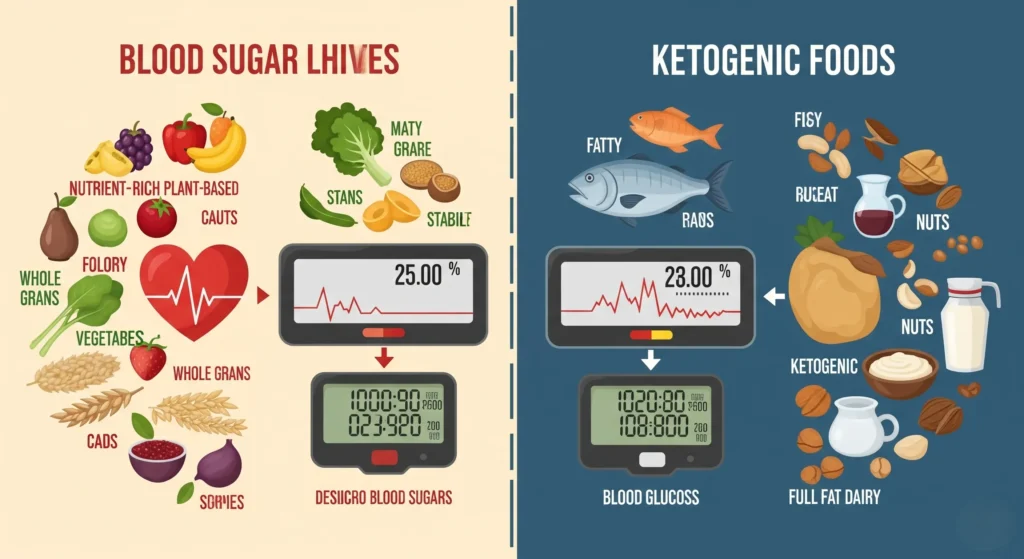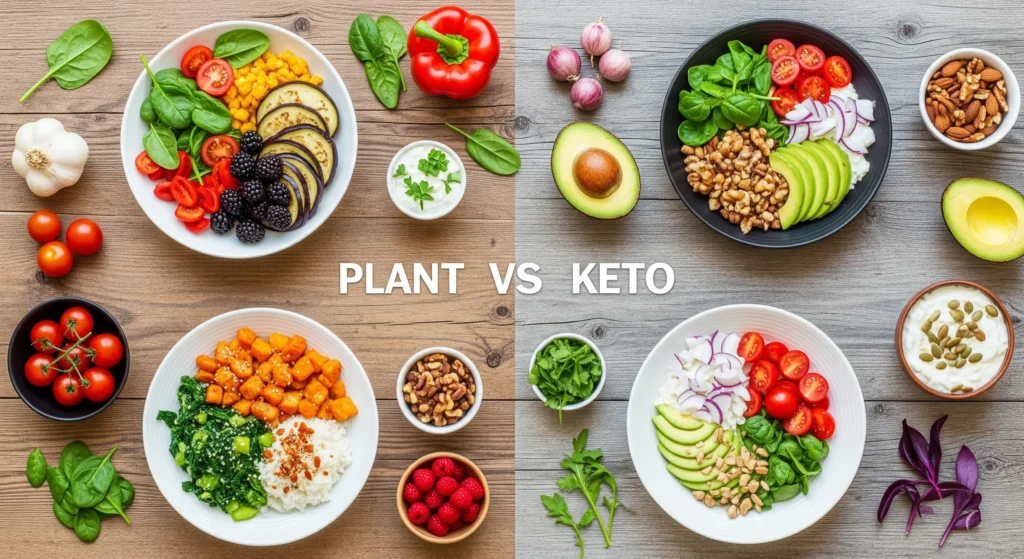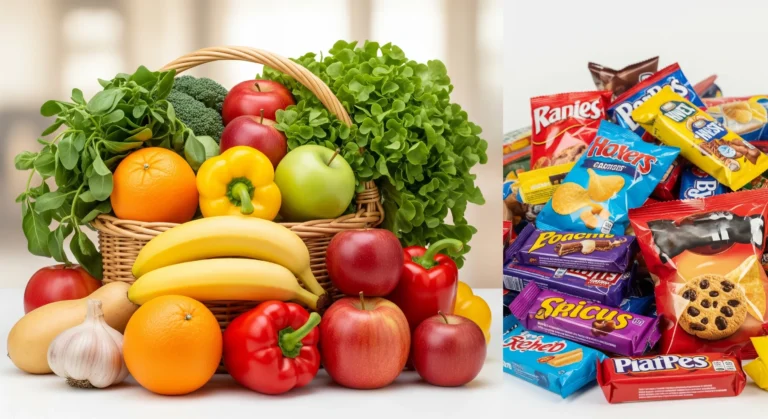Best One a win, Plant Based vs Keto: 5 Key Differences to Help You Decide

Introduction: A Quick Overview of the Diet
Plant-Based vs Keto: 5 Differences to Help You Decide
Considering which diet to follow can feel quite daunting. With so many choices, Plant Based vs Keto are the two most common diets; both have a considerable following, and both use food, health, and nutrition in very different ways.
But which is better for you?
In this article, we outline five differences between the plant-based and keto diets to give you further insight into which one will better suit your lifestyle, health goals, and everyday routine. We’ll also give you expert opinions, name examples, and advice,
Did you know? A 2022 study published by Frontiers in Nutrition found both plant-based and low-carbohydrate ketogenic diets conferred benefits for weight control and metabolic parameters, but the results are highly dependent on individual lifestyle and goals.
1. Diet Philosophy: What’s In, What’s Out
Plant-based diets are supposed to consist of food that comes from plants. Foods from plants mean that fruits, vegetables, legumes, whole grains, nuts, seeds, etc., are allowed. Many people in this category may not consume animal products at all (vegan) or may simply try to use them in moderation.
On the other hand, the keto diet (short for ketogenic diet) is low-carb, high-fat, and moderate protein to achieve ketosis. The keto diet restricts foods like fruits, sugar, and grains, while allowing foods that include meats, cheese, butter, oils, and eggs.
Plant-based diet foods include:
- Whole fruits & vegetables
- Whole grains
- Legumes (beans, lentils)
- Nuts & seeds
Keto foods include:
- Meats & fatty fish
- Eggs and dairy
- Healthy fats (avocado, oils)
- Low-carb vegetables (spinach, broccoli)
Action Tip: If you have a thirst for ethical eating or sustainability and love starches like oats and fruits, a plant-based diet may accommodate you. If you have more of a focus on weight loss, low-carb context, or managing insulin sensitivity, the keto diet may be a better option for you.

2. Weight Loss Outcomes: Which Diet is Better?
Both diets produce weight loss, but they promote weight loss in different ways.
The keto diet provides a more rapid initial weight loss due to water loss from carbohydrate restriction. After the initial water weight loss, ketosis allows for fat burning and appetite suppression. If quick results are your goal, this is a motivating option.
The plant-based diet, particularly when focused on whole foods (rather than processed vegan snacks), allows for slower weight loss, but this can be more sustainable. It can lead to lower-calorie and higher fiber foods to keep you full longer.
Example
In an article published in the Journal of the American College of Nutrition, the participants who consumed a whole-food plant-based diet lost an average of 7.5 pounds more than participants who consumed an omnivorous, calorie-restricted diet, throughout 12 weeks.
Action Tip
If you find motivation in quick weight loss, you may want to try a keto meal plan. If your main goal is long-term health and improved digestion, you may want to try the Vegan Cooking Meal Plan.
3. Nutrition Quality: Fiber vs. Fats
The plant-based diet uses whole plant foods as the main source of nutrients and consequently offers a source of high fiber, antioxidants, and micronutrients. Fiber positively affects digestion, cholesterol, and blood sugar levels.
By comparison, the keto diet is very high in healthy fats such as MCT oil, olive oil, and avocado, which allow it to provide energy to the brain and body in a low-carb state. However, nutrition-guided keto can be deficient in several nutrients, especially fiber, magnesium, and several B vitamins.
Nutrient Summary:
- Plant Based: High in fiber, Vitamin C, potassium.
- Keto: High in fat (omega-3s), Vitamin D, and B12 (if consuming animal products).
Action Steps:
If your primary goals are gut health and long-term cardiovascular protection, plant-based is likely a better option. However, if you’re looking for mental focus or improved insulin control, the keto diet with its fat-fueled style of eating may be beneficial! I recommend a multivitamin to help out with the nutritional voids that standard keto may have.
Learn More: See more about how this corresponds with our article comparing whole to processed foods.

4. Health Goals & Health Conditions
Of course, your personal health goals will be the main factor in achieving a personal decision.
The keto diet is often recommended to people with type 2 diabetes, epilepsy, or metabolic syndrome. For some, the effects of reducing blood sugar and insulin levels are life-changing.
The plant-based diet helps with heart health, lowers blood pressure, reduces some cancer risks, decreases inflammation, and may improve cholesterol levels.
Best For:
- Keto: weight loss, epilepsy, blood sugar control
- Plant Based: Cancer prevention, blood pressure, heart health, digestive health
Action Tip:
If you’re managing a specific illness, it’s best to connect with a healthcare provider before starting either approach. You can also access some templates from reputable sources such as this, The Complete Plant-Based Recipe Cookbook – 200+ Vegan.
5. Sustainability and Lifestyle Fit
The best diet is one you can maintain. Sustainability is a key factor.
Most people who follow a plant-based diet are likely to feel greater alignment with their ethical and environmental principles. The environmental issues of greenhouse gases, water conservation, and engagement in animal farming are something to uphold and reflect on. In addition, with a wealth of food choices, individuals may find eating a variety of plant-based foods more fulfilling than restricted keto eating.
In comparison, keto diets can be very effective in the short term; however, people can find it restricting, difficult to maintain while being socially engaged, and undesirable when dining out, traveling, or simply trying to find keto-approved ingredients. Although keto has its benefits, many of the foods (animal-based) can conflict with certain nutritional principles for many individuals.
Action Tip:
If you’re looking for a lifestyle you can maintain and feel good about, the plant-based diet is typically the easier long-term option. Keto may be an option if you’re looking for something more short-term to achieve an objective or due to finding a structured plan, such as this meal align plan, that is easy to follow.
FAQs
- Is a plant-based diet healthier than keto?
Both a plant-based diet and a keto diet have health benefits. Plant-based diets are better for heart health and digestion, while keto can help with weight loss and blood sugar regulation. It depends on what you’re aiming for. - Can you do a vegan/keto combo?
Yes, it’s possible to follow a Plant-Based vs Keto diet if you lay out plans for low-carb vegetables, nuts, seeds, and healthy fats like avocados or olive oil. However, it needs to be planned carefully. - Which one is easier to follow long term, Plant Based vs Keto?
A plant-based diet is easier to hold onto long term for most people because they have variety and flexibility, plus the diet lines up with their ethical beliefs. Keto might be more challenging socially, or when traveling.

Conclusion: So, Which Diet Is Right for You Plant Plant-Based vs Keto?
In the end, the winner between plant-based and keto is up to you and your specific goals.
- Are you looking for the most sustainable, fiber-filled, ethical diet? Plant Based
- Are you trying to break through plateaus in rapid fat loss to regain appetite control and support blood sugar levels? Keto
Both diets can leave you feeling better while maintaining or losing body weight. In the end, the goal should be to find your fit for your body, lifestyle, and belief system. Take the time to research meal plans, try out various recipes, and see how you feel.
You could consider starting with a guided plan, Plant-Based vs Keto :
- 👉 Keto Meal Guide with Claudia Caldwell
- 👉 VeganPlant-Based Cookbook
- 👉 The Complete Plant-Based Recipe Cookbook – 200+ Vegan
Ultimately, whichever diet you choose, Plant Based vs Keto, eating with more intention is an important step toward better health.






